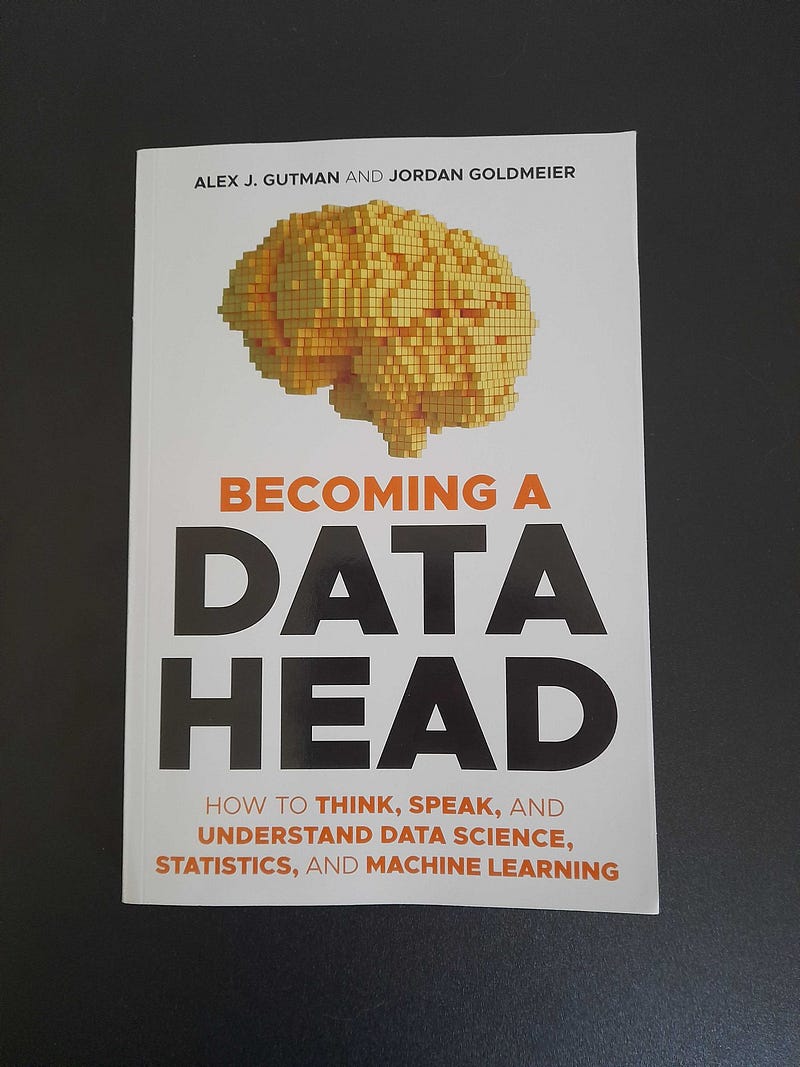Insightful Review of "Becoming a Data Head" by Gutman & Goldmeier
Written on
Introduction to the Review
I recently completed the guide "Becoming a Data Head" by Alex J. Gutman and Jordan Goldmeier. Here are my reflections on the book.

In this first review, I plan to regularly discuss noteworthy books that have captured my interest over the years. Today, we delve into "Becoming a Data Head," which aims to enhance your understanding of data science, statistics, and machine learning.
Why I Chose This Book
Given my extensive writing on data science communication, I often contemplate the best methods to convey my ideas effectively. Serving as a translator among teams, stakeholders, and clients has significantly propelled my career. Noticing a gap in my reading on data communication recently, I was drawn to this book, which focuses on cultivating a mindset akin to that of a data expert. The title itself suggests a transition into a data-centric way of thinking, essential for those engaged in data-related tasks.
Upon a brief review of its contents, it appeared to strike a favorable balance between technical and commercial insights. Given the scarcity of literature in this area, I deemed it worthwhile to explore further. Additionally, I was mindful that my views are shaped by my unique experiences; both authors boast impressive careers that differ from mine, potentially providing fresh perspectives.
Target Audience
The back cover states:
"Whether you’re a business professional, engineer, executive, or aspiring data scientist, this book is for you."
I find this claim largely accurate. For those with experience in data, much of the content might serve as a helpful refresher. The book is well-structured and presented in an easily understandable manner, making it a valuable resource for revisiting familiar topics. As someone well-versed in data science, I sought clear explanations of concepts that resonate with non-technical audiences, and the authors delivered.
This book is particularly beneficial for individuals who work alongside data teams, as well as those eager to grasp the fundamentals of data science without delving into complex technicalities. It's an excellent recommendation for senior leaders interested in understanding the work of their data science teams. Additionally, the book is concise, spanning just 213 pages, making it manageable for busy professionals.
Key Takeaways in Three Sentences
The book offers a refined overview of essential data science concepts, highlighting what is vital to data scientists and the factors that contribute to project success. It emphasizes the critical role of communication and alignment among teams for effective data science outcomes. Furthermore, it introduces key tools in the data science arsenal without overwhelming the reader with advanced mathematics or programming.
Favorite Aspects
I particularly appreciated the book’s four-part structure, guiding readers through the process of framing problems with data, communicating effectively, and utilizing tools for inquiry, before discussing project success and failure. Chapter 13 is especially valuable, with Chapter 14 also worth noting. The authors candidly address industry failures and the confusion created by over-hyped technologies, providing a refreshing honesty.
Lasting Impressions
Reading "Becoming a Data Head" has proven beneficial, offering new perspectives and terminology for my communication strategies. I anticipate referring to this book frequently in my work, as it provides concise and precise descriptions of complex topics. I will undoubtedly recommend it to senior leadership and clients seeking an understanding of data science without the technical jargon.
Final Thoughts
Overall, this book is a worthwhile read that I will advocate for among non-data professionals in leadership and client roles. It succinctly presents core data science topics, ensuring the reader gains the essential knowledge needed to ask informed questions and determine their next steps in the data landscape.